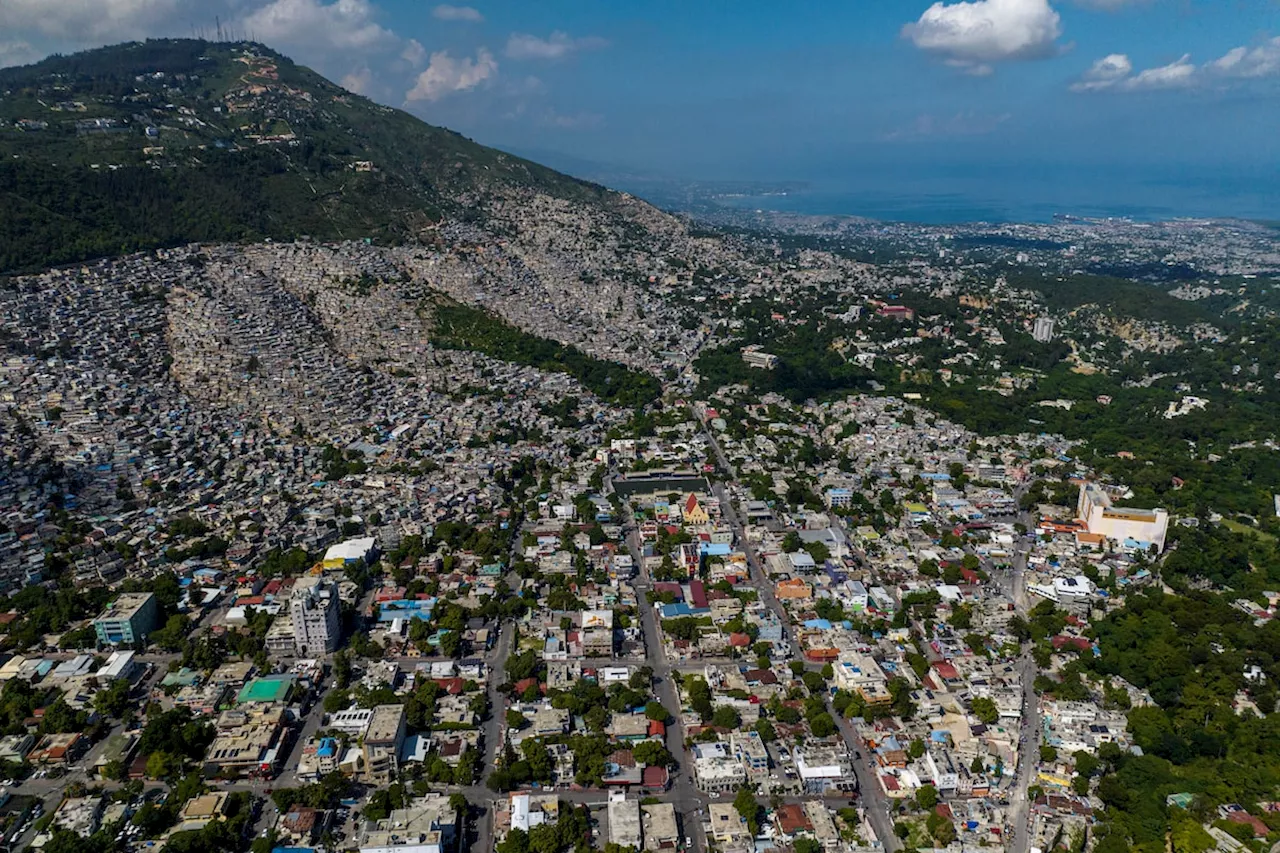This article investigates the role of Haiti's economic elite in the country's spiraling crisis. It examines allegations that powerful business families have financed gangs, evaded taxes, and manipulated politicians, contributing to the widespread violence and instability plaguing Haiti.
The manicured greens and fairways of the Petionville Club, perched on a hill overlooking the city, are partially owned by businessman Reynold Deeb, a major importer of consumer goods. When the Canadian government was evacuating some of its citizens last March because gangs had taken over the capital, killing thousands and displacing half a million others, the embassy approached Mr. Deeb about using his property as a helipad. He graciously obliged.
'We have diligently done our best to make this delicate and dangerous operation a total success,' Mr. Deeb wrote to Canadian consul Catherine Brazeau. The operation was delicate in part because, just over a year earlier, Global Affairs Canada had accused Mr. Deeb of financing gangs - the same ones its citizens were now fleeing from his golf course. He was placed on a sanctions list that forbade Canadians from doing business with him. Canada ultimately added seven more members of the Haitian elite to its sanctions list for colluding with organized crime in the country. They belong to the dozen or so families of European or Middle Eastern descent who largely control Haiti’s impoverished economy, and are now blamed by many citizens and international bodies – including the United Nations – with helping sow its brutal harvest of gang violence. Haitians have many colourful nicknames to describe these people and their influence. Some call them the BAM BAM, an acronym for six leading business dynasties – the Brandts, Acras, Madsens, Bigios, Apaids, and Mevs. Others call them the bourgeois, or simply the oligarchs. While politicians like the Duvaliers are well known in the country’s story, the oligarchy has received little attention outside of Haiti. But now that bodies litter the streets of Port-au-Prince, an international police force attempts to restore order and a new Prime Minister tries to establish his authority, the question of how the country spiralled into such chaos is more urgent than ever. Police in Port-au-Prince are up against a well-armed and organized network of gangs that have seized much of the capital, and many civilians have died in the clashes between them. Although members of the Haitian upper class deny the accusations against them, close observers of the country say a rapacious economic elite is a significant and mostly hidden part of the answer. By dodging taxes, financing politicians and funding gangs as private militias, a small group of business leaders have helped fuel the country’s current crisis. ‘I guarantee there is a positive integer of oligarchs who have used the gangs for security and paid them,’ said Dan Foote, the U.S. Special Envoy for Haiti from July to September, 2021. ‘They’ve been running the country for at least 120 years.’ The business leaders at the centre of this story have all denied the allegations made against them by the Canadian government and others. Reynold Deeb said in a response to The Globe and Mail that Canada’s claims ‘are false and have been made without any evidence, just rumours and the Haitian equivalent of tabloid articles.’ The former shipping magnate Marc-Antoine Acra said his business empire has been destroyed because of the sanctions. Gilbert Bigio’s lawyer wrote: ‘Any statement or implication that Mr. Bigio has any connection to or bears any responsibility for financing gangs, gang violence, arms dealing, tax evasion, murder or any other crimes in Haiti or elsewhere is false and defamatory.’ The accusations against individual members of the private sector, which span decades and cover most of recent Haitian history, are in some cases difficult to prove. But dozens of interviews with scholars, former government officials and civil society actors – along with hundreds of pages of court documents and leaked financial and diplomatic records – reveal how the country’s economic elite helped turn Haiti into a failed state. Gregory Brandt, Reuven Bigio and Réginald Boulos go about their days in 2011. Mr. Brandt’s wealth comes from soap and oil; Mr. Bigio’s GB Group works in steel, telecom, banking, oil and food; Mr. Boulos, a medical doctor, owns supermarkets, news outlets and agribusiness concerns. Pétion-Ville, an affluent suburb, neighbours a mountainside slum called Jalousie, or ‘jealousy.’ Petionville is named for Alexandre Sabès Pétion, a leader of the Haitian independence struggle in the early 1800s. Haiti was born from the ashes of the world’s only successful slave revolt and was established as the world’s first Black republic in 1804. By the turn of the 20th century, however, the “Pearl of the Antilles” – as Haiti was once known – began attracting some of the European and Middle Eastern immigrants who were reshaping economies across Latin America. By 1910, roughly 200 German families controlled a large share of Haiti’s international trade, while Levantine merchants did so well that a popular movement arose to expel them from the country, successfully in some cases
Haiti Gang Violence Oligarchy Economic Elite
Canada Latest News, Canada Headlines
Similar News:You can also read news stories similar to this one that we have collected from other news sources.
 Senators host business leaders for first Power Play Women in Business eventAt the first annual Power Play Women in Business event presented by Canadian Tire, almost 200 local business leaders attended the Ottawa Senators game Thursday night.
Senators host business leaders for first Power Play Women in Business eventAt the first annual Power Play Women in Business event presented by Canadian Tire, almost 200 local business leaders attended the Ottawa Senators game Thursday night.
Read more »
 Canadian Clara Emond continues her law studies as she competes as an elite road-racerPassing the bar exam is something to celebrate. So is winning a stage at the Giro d'Italia. Canadian Clara Emond has both on her resume. The 27-year-old from Saint-Ferréol-les-Neiges, Que.
Canadian Clara Emond continues her law studies as she competes as an elite road-racerPassing the bar exam is something to celebrate. So is winning a stage at the Giro d'Italia. Canadian Clara Emond has both on her resume. The 27-year-old from Saint-Ferréol-les-Neiges, Que.
Read more »
 Canadian Clara Emond continues her law studies as she competes as an elite road-racerPassing the bar exam is something to celebrate. So is winning a stage at the Giro d'Italia. Canadian Clara Emond has both on her resume. The 27-year-old from Saint-Ferréol-les-Neiges, Que.
Canadian Clara Emond continues her law studies as she competes as an elite road-racerPassing the bar exam is something to celebrate. So is winning a stage at the Giro d'Italia. Canadian Clara Emond has both on her resume. The 27-year-old from Saint-Ferréol-les-Neiges, Que.
Read more »
 Canadian Clara Emond continues her law studies as she competes as an elite road-racerPassing the bar exam is something to celebrate. So is winning a stage at the Giro d'Italia. Canadian Clara Emond has both on her resume. The 27-year-old from Saint-Ferréol-les-Neiges, Que.
Canadian Clara Emond continues her law studies as she competes as an elite road-racerPassing the bar exam is something to celebrate. So is winning a stage at the Giro d'Italia. Canadian Clara Emond has both on her resume. The 27-year-old from Saint-Ferréol-les-Neiges, Que.
Read more »
 Canadian Clara Emond continues her law studies as she competes as an elite road-racerCanada’s Clara Emond is continuing her law studies and working on her master’s degree, although her progress has been slowed by her racing career
Canadian Clara Emond continues her law studies as she competes as an elite road-racerCanada’s Clara Emond is continuing her law studies and working on her master’s degree, although her progress has been slowed by her racing career
Read more »
 Winnipeg Curling Club Becomes Training Hub for Elite AthletesWinnipeg's Heather Curling Club is piloting a new program to serve as a training hub for Canada's top curlers and future stars.
Winnipeg Curling Club Becomes Training Hub for Elite AthletesWinnipeg's Heather Curling Club is piloting a new program to serve as a training hub for Canada's top curlers and future stars.
Read more »
